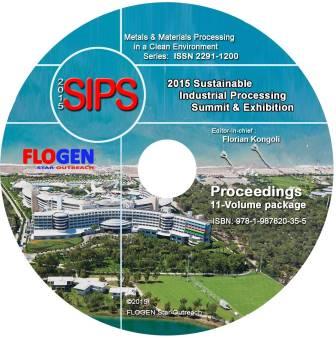2015-Sustainable Industrial Processing Summit
SIPS 2015 Volume 1: Aifantis Intl. Symp. / Multiscale Material Mechanics
| Editors: | Kongoli F, Bordas S, Estrin Y |
| Publisher: | Flogen Star OUTREACH |
| Publication date: | 23 December 2015 |
| Pages: | 300 pages |
| ISBN: | 978-1-987820-24-9 |
| ISSN: | 2291-1227 (Metals and Materials Processing in a Clean Environment Series) |

< CD shopping page
Advances in Complexity Theory. Connection to Tsallis non Extensive Statistical Mechanics
George Pavlos1;1DEMOCRITUS UNIVERSITY OF THRACE, Xanthi, Greece;
Type of Paper: Invited
Id Paper: 464
Topic: 1
Abstract:
In this study, we present the highlights and significant characteristics of Complexity theory, as well as we provide the new mathematical framework needed to describe the rich phenomenology arise in complex systems' behavior far from equilibrium.
Physical processes, regarding complex systems, are characterized by nonlinear dynamics and are present everywhere from the microscopic to the macroscopic level. In particular, the nonlinearity of continuous media is a basic characteristic of complexity, giving rise to the far from equilibrium rich phenomenology which is related to all the topics and manifestations of complexity theory. A non-exhaustive list of characteristics of such behavior includes: strange dynamics, anomalous diffusion, multifractal topology, intermittent turbulence, percolation, fractons, power-scaling laws, low dimensional or spatiotemporal chaos, self-organized critical behavior, self-organized nonlinear instabilities as nonequilibrium stationary states, nonequilibrium phase transition processes, nonGaussian statistics etc. In order to describe the aforementioned behavior of complex systems, current applied mathematics and statistics are inefficient and extensions have to be made in order to effectively "capture" the dynamics and its evolution.
Such extensions are the fractional extension of dynamics of continuous media, the fractional extension of Bogoliubov–Born–Green–Kirkwood–Yvon (BBGKY) hierarchy of statistics and fractional Fokker Planck equation, the fractional extension of Landau Ginsburg equation, the Tsallis q-extension of Central Limit Theorem (CLT), the fractional and Tsallis q-extension of renormalization group theory (RGT) etc.
Finally, one of the most important cornerstones of complexity theory is Tsallis nonextensive statistical mechanics, an extended version of Boltzmann-Gibbs statistical mechanics and notion of entropy, which is developed and capable to describe significant features of complex systems such as multifractality, scaling and long range correlations. Basic characteristics of Tsallis statistics and its relation to the fractional extension of mathematical theory will also be given.